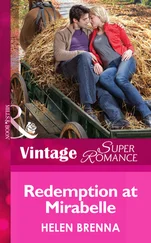Lifting his head from the depths of his excavations, he looked at me and raised an eyebrow.
‘Couldn’t the changes be a little less . . . dramatic?’ I asked.
Warren rested a hand on his shovel, sighed deeply and assured me everything would be fine. Fools and children should never see things half done.
Once new earth was delivered and pressed into the cavity, the shape of the new garden started to emerge. The levels Warren had gone to such trouble to create turned out to be perfect. The unusable slope leading up to the apple tree had transformed into an inviting terrace to be covered in lawn. Warren also created a beautiful front path with recycled bricks inlaid with small river stones. He built a stand in the centre of the flattened soil and cemented the water bowl in place. I felt foolish for having doubted him.
Fortunately, Warren still liked me enough to invite me to climb into his ute to visit a garden centre. Even though the drought was officially over, I wasn’t willing to take risks with plants. Our garden had to be able to survive weeks, possibly even months, with no rain or watering. Hardiness was a prerequisite and perfume was desired. I also wanted the plants to have personal meaning.
For years I’d taken olive trees for granted. While I respected their resilience and the relationship they’d had with people through history, I’d always regarded them as straggly, grey plants. Then I saw a painting by Van Gogh in which he’d portrayed olive trees as wise, silvery beings. Like the painter himself, these olive trees were no strangers to suffering but Van Gogh depicted them as tough and shimmering with vitality. When I was finally able to visit the olive grove Van Gogh painted near Saint-Rémy-de-Provence in France, I almost wept. What greater gift can a genius give than to teach others how to see the world?
Olive branches also symbolise peace. For millennia they’ve provided succour with their fruit. Peace and nurture: perfect for a Gratitude Garden. Warren ordered several well-developed olive trees to go along the front and side fences to (ultimately) provide privacy.
Rosemary is underrated. Not only is it hardy, it provides perfume for a garden, food for bees and flavouring for roast lamb. Also, according to Shakespeare, rosemary symbolises remembrance. Mum had always kept a vase of rosemary sprigs on her table in homage to those she’d lost. As years went by and more of her friends and relations passed away, the vessel became so crowded she needed a bigger vase. In honour of Mum and many other angels, we planted a rosemary hedge alongside Warren’s new path.
Deep red roses went in under the living room window from which Jonah liked to survey his realm. Their perfume would spread sensuously through summer evenings.
Katharine put in a request for lavender, which passed both the perfume and hardiness tests. When Warren planted a couple of large bushes in front of the roses, the bees could hardly wait.
In homage to New Zealand, I bought some bronze flaxes which went in a row along one of the side fences. Sadly, they craved the damp climate of our homeland and didn’t thrive as vigorously as the native grasses behind the front fence – or even the gardenia bushes Warren had planted under the semicircular seat. I’d taken Mum a gardenia flower when she was dying and she’d drunk in its perfume as though it was life itself.
The effect was enhanced with pots of spectacular succulents either side of the front door. Exploding in outrageous shapes of mauves, greens and coppers, they contrasted against Shirley’s red bricks.
Only one task remained. The focal point of the new garden had yet to spring to life. Lydia and I watched from my study window as Warren filled the bowl with a hose and connected the pump. We held our breath. Nothing happened. Unperturbed, Warren strode around the side of the house to tweak the electrics.
There was a hum, followed by a gurgle, then water splashed joyfully over the orb.
Our next task was to go to the pet shop and buy some goldfish. Anyone who says goldfish have a short memory hasn’t observed them. Every morning, three orange streaks waited in exactly the same spot to be fed. They grew long and plump in their new home – and adept at avoiding dive-bombing pigeons in need of a bath.
Our Gratitude Garden complete, I’d often look up from my computer screen to see Lydia sitting on the circular seat. Sometimes I’d join her and we’d gaze on the sprouting leaves with the satisfaction of those who’ve shared an act of creation.
Sitting together in the garden, our conversations weren’t as jagged as they used to be but my daughter still seemed to withhold her deepest thoughts.
Obsession
Beware the dejected cat. He will seek revenge
With his designer cat run, a retinue of human groupies and a house bursting with fishing rods, ribbons and scratching posts, Jonah was the feline who had everything. When a smart red portacot with stainless steel legs and mesh sides appeared in the living room one afternoon, he naturally assumed it was yet another item for his enjoyment. Raising his tail in a question mark, he put his head to one side, sniffed its new smell and purred.
‘It’s not for you, Jonah,’ I said, watching him circle the portacot at increasing speed.
Deaf to my words, he sprang into the bed’s squishy depths and pranced over the mattress.
‘Come out!’ I cried, trying to catch him. But he slithered from my grasp and bounced on to the floor. Just as I was about to praise him for an uncharacteristic display of obedience, he sailed past my nose back into the cot. Into the cot, out of the cot, into the cot . . . Another new game that, as far as Jonah was concerned, could go on for the rest of the year.
‘It’s the baby’s cot!’ I said, lifting him again and again from his mesh-walled pleasure palace.
The idea that something new and fun could arrive in the house and not be specifically meant for his enjoyment was new to Jonah. Taken aback, he changed his approach. Instead of being designed for jumping in and out of, he decided maybe it was just a bed. He seized every opportunity to jump in and curl up on the mattress. Hauling him out, I remembered how horrified Mum had been when Cleo climbed into Lydia’s cot before she was born. Cats, she’d said, could smother babies.
I was pleased to discover the cot had a detachable mesh roof that could be zipped into place – presumably to keep out insects. Even that didn’t work. Jonah was almost as happy to sleep on top of the cot as to play in it. The cot, as far as he was concerned, was his.
I started hiding the cot in various rooms, but he always found out where it was and scratched and yowled to be let in.
Jonah sensed a power shift in the household – one that wasn’t in his favour. The tension revolved around the red portacot.
Then one day it happened. Jonah woke from his afternoon nap on Katharine’s bed and ambled downstairs into his worst nightmare. The portable cot – his playpen – was inhabited by a strange alien form. The intruder was virtually hairless, a plump blob resembling a pink jellybean. Jonah shuddered in revulsion. Not only had the jellybean taken over his playpen and fallen fast asleep in it, every human in the household, as well as Rob and Chantelle – who’d brought baby Annie over for a visit – were ‘oooooing’ and ‘aaaahhhing’ over the jellybean in tones he hadn’t heard since he was a kitten.
Watching Jonah shrink back into his fur, I could tell he was assessing the situation. He could hardly believe his ears when he heard people saying, ‘Isn’t she beautiful ?’ and ‘Oh, she’s so cute !’
Beautiful and cute were his words. Through disbelieving slits, he examined his humans. They’d gone berserk. Had they forgotten he was the only one who deserved to be ooooed and aaaahed over?
Читать дальше












